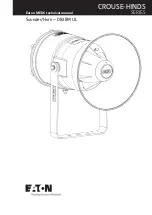
Page
22
of
30
9.
MAINTENANCE
It is recommended to periodically inspect the unit, both visually and physically, to insure optimum
and safe performance. This inspection should be scheduled as a routine maintenance
procedure, done with the unit power OFF and with the unit unplugged from the AC power source.
Long exposure to acids or caustics results in corrosion of metal parts or components. Check the
power supply, converter, and cables periodically for any signs of rust or discoloration. If
discoloration is found, move the ultrasonic processor away from the source of the contaminant.
Examine the condition of the high voltage cable that attaches the converter to the power supply.
Inspect the wire insulation for damage, such as wear, burning from hot plate contact or breakage
from extended use or rough handling. In general use, the cable assembly should not be used to
carry the converter or pull it toward the user. Make certain the cable always has slack and is
never tensioned. If necessary, move the power supply or converter assembly closer to one
another to accomplish this. If this is not possible, contact your Customer Service Representative
to obtain a longer cable.
WARNING: Do not use a cable with broken end connections, exposed wires or frayed
insulation. High voltage is present in the cable and will pose a shock hazard. Do not
touch the converter assembly until the power switch is off and the unit is unplugged.
9.1.
MICROTIP / PROBE MAINTENANCE
Ultrasonic processors create high intensity vibration which puts stress on the converter and horn
assembly. The sides and end of the probe must
never
be allowed to come in contact with
anything but the solution while in operation. When using a Microtip, the stress resulting at the
point of contact with the vessel could cause the Microtip to fracture.
Proper care of the probe is essential for dependable operation. The intense cavitation will, after
usage for period of time, cause the tip to erode, and the power output to decrease. The smoother
and shinier the tip, the more power will be transmitted into the sample. The vibrations may also
cause the probe tip to loosen over time or the threaded connection to accumulate debris. Note:
A loose probe will usually generate a loud piercing or squealing sound.
For that reason, it is recommended that a preventative maintenance schedule be adopted to
examine the unit at regular intervals. The schedule should depend on frequency of use. Weekly
maintenance schedules are recommended for units used frequently or monthly for those used
infrequently. The tip must be examined for excessive wear and to ensure that the threaded
connection is clean and attached properly to the converter. Use a cotton swab and alcohol (i.e.
ethanol, isopropyl, etc.) to clean the threaded mating surfaces.
When excessive wear (corrosion/pitting of the probe tip) is detected the probe should be
replaced with a new one.
WARNING: Hand-tightening horns onto the converter is not sufficient; properly tighten
them with the appropriate Wrench Set.
See below the steps for attaching and detaching
microtip probes:
Содержание Sonicator Q500
Страница 2: ...Page 2 of 30 ...









































